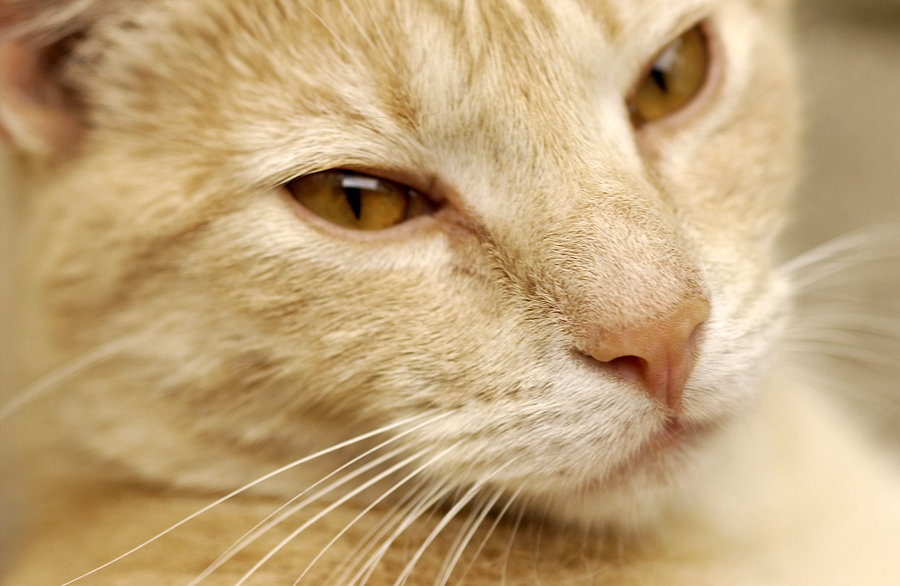When senior cats end up in shelters, it’s often because their elderly owners have passed away and there’s no one to care for them. The good news is that they are ideal housemates for everyone: millennial singles, empty nesters, and of course, human seniors. November is Adopt a Senior Pet month. Give a senior cat a second chance at love; you’ll be so glad you did!
Kittens are like toddlers; playful, fearless, tireless, naturally entertaining, and fun. But they don’t have an “off” button and living with them can be exhausting. And there comes a time in everyone’s life when peace, quiet, and relaxing companionship are just the ticket! Enter the senior kitty, bursting with love and affection and ready to introduce serenity into the home. They are mood-swingers in a good way.
To help welcome your new senior cat, make a few adjustments around the home to boost their comfort level.
Snooze Zones
Put pet beds in all the rooms where you spend a lot of time so they can keep you company everywhere. Consider a small pet pad on your desk. This way they can be close and simultaneously off your keyboard!
Pet steps are a plus for a senior kitty who may have some arthritis and struggle to access her favorite chair or your bed. If you don’t want steps to clutter rooms, purchase lightweight foam ones that you can move around easily.
Water on Tap
Cats love to drink from flowing water; it’s a throwback to their wild ancestry. Invest in a fountain and put other water bowls around the house too, especially in your bedroom if that where she sleeps at night. It’s important to keep a senior cat well hydrated.
Litter Box Considerations
Purchase a large litterbox that she can easily turn around in. Choose one with a low entry area for ease of access. High sides are always a plus to prevent litter from scattering outside the box.
Litterbox placement is key for a senior feline. In a multi-level home, place the box on the level where she spends most of her time. Keeping it in a basement or garage means she must negotiate steps every time she wants to use it, and this could be painful if she has joint issues. Think of your senior cat as your granny. Would you expect Granny to go down to the basement every time she needs a toilet?
See Me, Feel Me
Like humans, senior cats are often hard of hearing and may also have diminished eyesight. You don’t want them to catch a fright if they are in a deep sleep and you suddenly enter a room.
If you think your pet is losing her eyesight, you can help alleviate some of her anxiety by refraining from rearranging furniture. If you must, though, Tracerz, small Velcro tabs infused with essential oils, can be placed throughout the home to create “scent paths” for your pet to find her way more easily from room to room.
And, if your pet has hearing issues, change your behavior when you approach. Walk a little firmer so she feels the vibrations as you approach or turn on a flashlight to get a deaf pet’s attention.
Game Time!
Exercise is key to a pet’s mental and physical wellbeing, no matter what their age. Puzzle games are great entertainment and enrichment. You can hide treats or even a portion of your cat’s meal to offer the stimulation of working for food. Older cats also need exercise for good blood circulation and to prevent obesity. Engage your elderly cat in daily games with a wand toy. You can multitask. Namely, you can drink coffee or watch TV and do this at the same time!
You can also place her food bowl at the furthest point from her favorite snooze zone, which will ensure that she walks the walk!
Getting the Groom On
Cats are fastidious about their appearance. But sometimes with age, they struggle to reach their nether regions and will appreciate a little help. This is particularly important for cats with long hair. Regular brushing will stop fur tangling and matting, which is extremely uncomfortable. Grooming is a great way to spend quality time together too.
Wellness Checks
Senior kitties need at least one annual wellness check (preferably every six months). Your veterinarian will probably suggest a senior blood panel. Be sure to discuss her nutrition to ensure she is getting a balanced diet for her life stage.
This article was reviewed/edited by board-certified veterinary behaviorist Dr. Kenneth Martin and/or veterinary technician specialist in behavior Debbie Martin, LVT.








